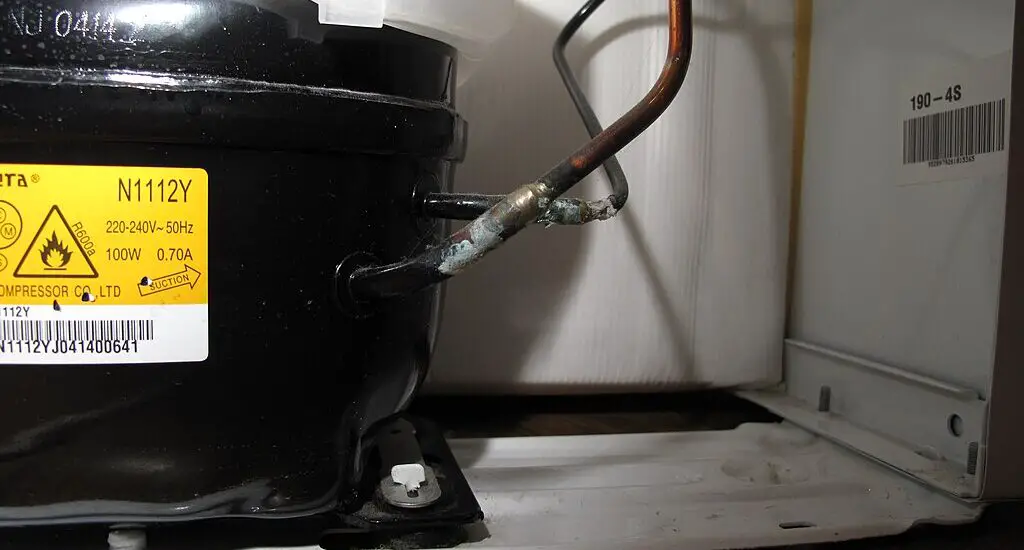If you’re wondering about your refrigerator compressor duty cycle, you’ve come to the right place. This article aims to give you a comprehensive, step-by-step guide to understand everything you need to know about the refrigerator compressor duty cycle.

Table of Contents
What is a Refrigerator Compressor Duty Cycle?
The refrigerator compressor duty cycle is essentially the ‘on’ and ‘off’ pattern of your refrigerator’s compressor, expressed as a percentage. Here’s how it works: The compressor is a motorized component that pressurizes refrigerant gas into the refrigerator’s cooling system. The thermostat inside the fridge monitors the internal temperature.
When the temperature exceeds the set limit, it triggers the compressor to turn on. It compresses the gas, which then circulates through coils, absorbing heat and thereby cooling the refrigerator’s interior. Once the thermostat senses that the desired temperature has been reached, the compressor turns off.
So, if your compressor is running 30 minutes out of every hour, it has a 50% duty cycle. This means the compressor is active 50% of the time and idle the other 50%.
Why is Understanding the Refrigerator Compressor Duty Cycle Important?
Knowing the duty cycle is not just a technical curiosity; it has real-world implications. An unusually high-duty cycle could mean the refrigerator is constantly running, consuming more energy, and stressing its components, thereby reducing its lifespan.
An abnormally low-duty cycle could mean that the fridge is not maintaining the proper temperature, potentially spoiling your food. Either way, understanding the duty cycle can be an early warning sign of other underlying issues, saving you from costly repairs and reducing energy bills.
Components Involved in the Refrigerator Compressor Duty Cycle
The duty cycle is a complex interplay between several components: the compressor, the thermostat, and the cooling coils.
The compressor is the engine driving the cooling process. The thermostat is like the control tower; it monitors the temperature and signals the compressor to turn on or off. The cooling coils are the pathways for the refrigerant, essentially doing the ‘cooling’ part.
A malfunction in any of these components can throw off the duty cycle. For instance, a faulty thermostat may inaccurately read the temperature, causing the compressor to run unnecessarily long, driving up the duty cycle and energy costs.
How to Measure the Refrigerator Compressor Duty Cycle
You can measure the duty cycle at home using just a timer and a piece of paper.
Choose a period—preferably one hour—to observe your fridge.
Start the timer as soon as you hear the compressor activate.
Stop the timer when the compressor turns off.
Record these intervals over the chosen period.
Calculate the total time the compressor was running and divide it by the total time observed.
Multiply the result by 100 to get the duty cycle percentage.
It’s advisable to do this over multiple periods to get an accurate average.
Check out these other articles…
Refrigerator Compressor Burnout: Identification & Solutions
Refrigerator Compressor Buzzing Not Cooling: DIY Fix Guide
Refrigerator Compressor Banging Noise: 3 Quick Fixes
Refrigerator Compressor Bangs When Shutting Off: Easy Fixes
Refrigerator Compressor Clicks But Won’t Turn On: Solved
What Do Different Refrigerator Compressor Duty Cycles Indicate?
Duty cycles can tell you a lot about the health and efficiency of your fridge. A duty cycle of over 80% suggests that the compressor is working overtime. This could be because of a variety of reasons—from a malfunctioning thermostat to a leaky door seal.
A duty cycle under 40% suggests the opposite: the compressor isn’t working enough to keep the refrigerator properly cooled, which could spoil your food. Both these extremes suggest that professional help may be needed.
Common Factors That Affect the Refrigerator Compressor Duty Cycle
Various external factors can influence the duty cycle. The surrounding temperature can affect how hard the compressor has to work; the warmer it is, the higher the duty cycle. Frequent door openings can also affect it, as it lets warm air in, making the compressor work harder.
In addition, the type of food stored, particularly hot or warm food, can also affect the cycle. Understanding these factors can help you optimize your refrigerator’s performance.